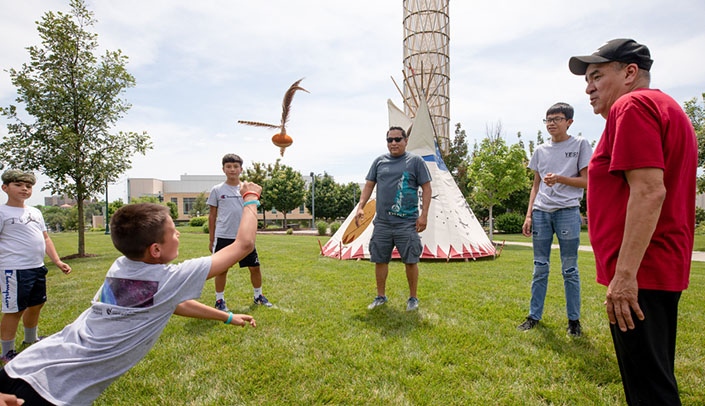It was the first time Evan Lonehill had ever attended a science camp that featured elements of his Native American culture.
In fact, it was the first time the 14-year-old had the opportunity to learn about the many different aspects of his Oglala Sioux heritage, courtesy of one of the instructors, Steve Tamayo, a traditional Lakota artist.
“I really enjoyed it, especially how the teachers tied the science into the culture,” Lonehill said.
Lonehill was one of 13 middle school students who participated in the weeklong YES! (Youth Enjoy Science) Middle School Science, Technology, Engineering, Art and Math Camp held June 24-28 at UNMC in partnership with the Omaha Public Schools – Native Indigenous Centered Education program.
The YES! program is funded by a grant from the National Institutes of Health National Cancer Institute and is aimed at increasing the number of Native American cancer research and health care professionals.
Maurice Godfrey, Ph.D., a professor in the UNMC Munroe-Meyer Institute, and Joyce Solheim, Ph.D., a professor in the Eppley Institute at UNMC, are the principal investigators.
“Providing health and science experiences is an excellent way to engage Native youth and, we hope, a means for increasing their desire to choose health and science careers,” Dr. Godfrey said.
The camp, coordinated by Aislinn Rookwood, a YES! education outreach specialist, focused on cancer-related careers and topics.
It featured presentations by:
- Echohawk Lefthand, program director for the OPS NICE program, on American Indian and Alaska Native health disparities;
- Nicole Tamayo, a specialist with the Urban Indian Health Coalition, on American Indian behavioral health;
- Kent Blansett, an associate professor of western American history at the University of Nebraska at Omaha, on native science; and
- Mark Gilbert, Ph.D., a research associate at Dalhousie University, Halifax, Nova Scotia, on art-based research.
“Western education and research does not have a strong history of respecting indigenous ways of being and doing. We wanted to offer a science camp that does,” said Regina Robbins, Ph.D., co-investigator of the YES! grant that supported the camp.
“We hope that by integrating the arts, medical humanities and hands-on experiences with the cultural relevancy of medical sciences it will spark an interest in these careers,” Robbins said.
Some of the traditions weaved into the camp included a traditional smudging at the start of each morning and some sessions taught inside a teepee erected on the west lawn outside the UNMC College of Public Health.
The students also toured cancer research labs in the Fred & Pamela Buffett Cancer Center and listened to presentations by research scientists.
“It is this kind of opportunity that helps our youth understand what opportunities exist and where they can make an impact,” Tamayo said. “I want to thank the university for allowing us to come here and bring our traditions and teach our youth in our ways of knowing and expose them to these important careers.”
The camp ended with the students creating artwork in different formats that reflected what they learned about cancer research.
An exhibit of the work, “The Body and Mind of Cancer,” will open in September with a display in the Criss Library at the University of Nebraska at Omaha.

Congratulations Dr. Godfrey and YES! Team on a successful camp!